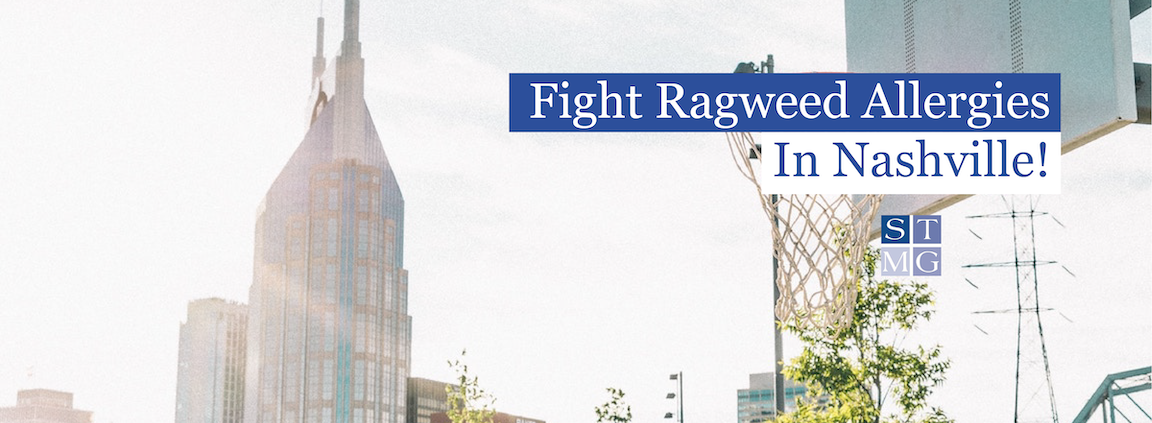Fight Ragweed Allergies In Nashville!
For many Nashvillians, August and September mark the unofficial end of summer and the start of the back-to-school season. Fresh starts, new beginnings, new seasons… but it’s not all rosy. No, in fact, for many residents of Davidson County and surrounding areas, August and September bring the much-dreaded ragweed season.
What Is Ragweed?
Ragweed is a flowering plant that makes many who suffer from Nashville allergies think, “I guess spring wasn’t so bad after all.” Yes, ragweed really can be that miserable, bad enough to make Nashville’s spring allergies seem manageable. (And that’s saying a lot, considering that Nashville ranks in the top 30 cities in the U.S. for allergies.)
Ragweed’s 17 species produce a fine-powder pollen beginning in the Southeast region during late July / early August. The plant’s bloom cycle continues north and to the west as the weeks progress. Though ragweed season is the worst in Nashville during August and September, the plant often remains active into the month of November. Individuals who are especially sensitive to ragweed may be affected until cold weather season settles in.
If you’re allergic to ragweed, it may not give you much comfort, but know that you’re in good company: three out of four people with allergies are allergic to ragweed.
What Are the Symptoms of Ragweed Allergies in Nashville?
Also known as “hay fever,” ragweed allergies can produce many of the symptoms typically associated with rhinitis (inflammation and swelling of the nose’s mucous membrane), including:
- Sneezing
- Itchy or runny nose
- Nasal cogestion
- Irritated, watery or puffy eyes
- Itchy throat
- Sinus headaches and pressure
- Trouble sleeping
In individuals with asthma, ragweed can exacerbate symptoms, resulting in worsened coughing and wheezing.
What Can I Do About Ragweed Allergies?
It’s you vs. the one billion pollen grains that every ragweed plant has the capacity to release. (Multiply that times the number of ragweed plants in the area!) But our team at St. Thomas Medical Group is on your side. Here are a few ways you can fight back against ragweed allergies.
#1 Avoid These Foods
“Avoidance therapy” is one of three common approaches to treating allergies. Of course, it doesn’t help much to say, “Avoid ragweed,” as the pollen spreads everywhere. (That being said, you will still want to try limiting or avoiding time outdoors.)
You can, however, avoid certain foods, whose plants contain pollens similar to ragweed. These include banana, zucchini, sunflower sees, cantaloupes, cucumber, and others.
#2 Additional Methods for Reducing Exposure
For people who suffer from ragweed allergies, the best thing you can do is to reduce your exposure to the pollen. Follow these tips as best as you’re able:
- Use HEPA air filters in your home HVAC system to help prevent pollen from entering the home.
- Don’t air dry clothing or sheets on an outdoor line where they can pick up pollen.
- If you spend an extended amount of time outside, remove shoes and clothing before entering the house so that pollen doesn’t track inside.
- Wash outdoor pets regularly to limit pollen from entering the home.
#3 See an ENT/Allergy Doctor in Nashville
An ENT doctor at Nashville’s St. Thomas Medical Group may be able to confirm a ragweed allergy by performing a skin prick test. During this test, a small amount of the allergen is introduced to the immune system, and the reaction is observed.
While there is no “cure” for ragweed allergies, a positive result on this test may help your allergy doctor recommend anti-allergy medications that may be helpful.
Get Help for Your Nashville Allergies With an ENT Doctor!
Do you suffer from ragweed allergies in Nashville? Or do you simply suffer from some kind of allergen… you’re just not sure what? See an ENT doctor (sometimes called an “allergy doctor”) at St. Thomas Medical Group for care. Call the Nashville ENT & Allergy Clinic at +1 (615) 386-9089 or send a message online.



